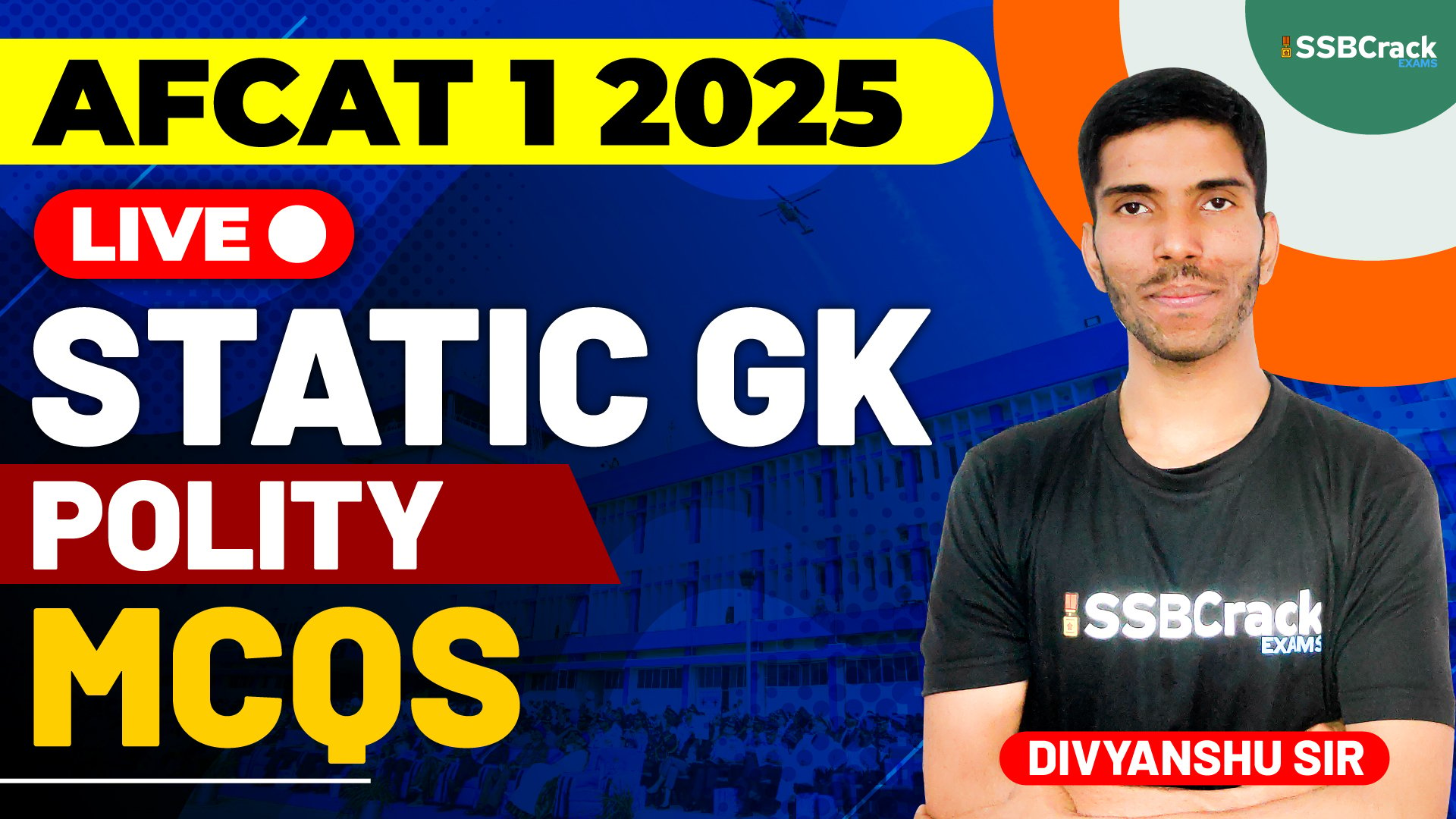Indian Polity is a crucial part of the Static GK section in the AFCAT 1 2025 exam. Questions in this topic generally revolve around the Indian Constitution, fundamental rights, duties, governance structure, and important constitutional bodies. A solid understanding of the political system will help aspirants answer questions accurately.
AFCAT 1 2025 Exam Static GK Indian Polity
1. Introduction to Indian Polity
- India follows a Parliamentary form of Government with a Federal structure.
- The Indian Constitution, adopted on 26th November 1949, came into effect on 26th January 1950.
- It is the longest written constitution in the world and originally had 395 Articles, 22 Parts, and 8 Schedules (now amended to 470 Articles, 25 Parts, and 12 Schedules).
2. Important Features of the Indian Constitution
| Feature | Details |
|---|---|
| Federal Structure | Division of power between the Centre and States |
| Parliamentary System | President as constitutional head, Prime Minister as executive head |
| Fundamental Rights | Guaranteed rights for all citizens (Articles 12-35) |
| Directive Principles of State Policy (DPSP) | Guidelines for governance (Articles 36-51) |
| Fundamental Duties | Responsibilities of citizens (Article 51A) |
| Independent Judiciary | Supreme Court, High Courts, and Subordinate Courts |
3. Important Parts of the Indian Constitution
| Part | Subject |
|---|---|
| Part I | Union and its Territory |
| Part II | Citizenship |
| Part III | Fundamental Rights |
| Part IV | Directive Principles of State Policy (DPSP) |
| Part V | Union Government |
| Part VI | State Governments |
| Part IX | Panchayati Raj System |
| Part XVII | Official Language |
4. Fundamental Rights (Articles 12-35)
| Right | Articles Covered | Description |
|---|---|---|
| Right to Equality | Articles 14-18 | Equality before law, abolition of untouchability |
| Right to Freedom | Articles 19-22 | Freedom of speech, expression, movement, etc. |
| Right Against Exploitation | Articles 23-24 | Prohibition of forced labor and child labor |
| Right to Freedom of Religion | Articles 25-28 | Freedom of religion and practices |
| Cultural & Educational Rights | Articles 29-30 | Protection of minorities’ educational rights |
| Right to Constitutional Remedies | Article 32 | Right to approach the Supreme Court for fundamental rights protection |
5. Directive Principles of State Policy (DPSP) – Articles 36-51
- Inspired by Irish Constitution, these are non-enforceable guidelines for governance.
- Aim to establish social and economic justice.
Important DPSPs
- Article 39A – Equal justice and free legal aid
- Article 44 – Uniform Civil Code (UCC)
- Article 45 – Free and compulsory education (now in Article 21A)
6. Fundamental Duties (Article 51A)
- Added by 42nd Amendment Act, 1976.
- There are 11 Fundamental Duties.
- Include respecting the Constitution, safeguarding public property, promoting harmony, etc.
7. Important Constitutional Amendments
| Amendment | Year | Significance |
|---|---|---|
| 1st Amendment | 1951 | Added restrictions to fundamental rights |
| 42nd Amendment | 1976 | Added Fundamental Duties, changed Preamble |
| 44th Amendment | 1978 | Removed Right to Property from Fundamental Rights |
| 61st Amendment | 1988 | Reduced voting age from 21 to 18 |
| 73rd Amendment | 1992 | Introduced Panchayati Raj System |
| 101st Amendment | 2016 | Introduced GST (Goods and Services Tax) |
8. Important Constitutional Bodies
| Body | Established By | Function |
|---|---|---|
| Election Commission of India (ECI) | Article 324 | Conducts free and fair elections |
| Union Public Service Commission (UPSC) | Article 315 | Conducts civil services and defense exams |
| Finance Commission (FC) | Article 280 | Distributes financial resources between Centre and States |
| Comptroller and Auditor General (CAG) | Article 148 | Audits government accounts |
9. Structure of the Indian Government
Legislature
- Parliament (Bicameral System)
- Lok Sabha (Lower House) – 543 Members, elected for 5 years
- Rajya Sabha (Upper House) – 250 Members, 6-year term
Executive
- President of India – Head of the State, elected for 5 years
- Prime Minister & Council of Ministers – Responsible for day-to-day governance
Judiciary
- Supreme Court (Chief Justice + Judges) – Highest judicial body
- High Courts & Subordinate Courts – Handle state and district-level cases
10. Important Articles of the Indian Constitution
| Article | Provision |
|---|---|
| Article 1 | India, i.e., Bharat shall be a Union of States |
| Article 14 | Equality before law |
| Article 21 | Right to Life and Personal Liberty |
| Article 32 | Right to Constitutional Remedies |
| Article 44 | Uniform Civil Code |
| Article 51A | Fundamental Duties |
| Article 370 | Special status to Jammu & Kashmir (Removed in 2019) |
Conclusion
Indian Polity is a vital topic for AFCAT 1 2025 and requires a strong understanding of the Constitution, governance, rights, duties, and political structure. Aspirants should focus on important articles, amendments, constitutional bodies, and government structure to score well in the exam.








